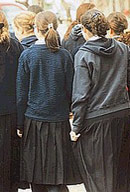
Emmanuel is an underprivileged ultra-Orthodox settlement in the northern West Bank. Much of the population is Sephardi (with origins in the Arab world) and politically loyal to the Shas party. A minority are Ashkenazi (of European heritage) and hasidic. With Emmanuel’s fortunes in decline, better-off families have left, to be replaced in recent years by newly religious and poorer Sephardim.
Ashkenazi parents in Emmanuel say that their children were being negatively influenced by the “intolerable” deportment of Sephardi girls at the town’s well-regarded, state-licensed, and state-assisted Beit Ya’acov School. To preserve their mores, the parents put up a barrier and created a school-within-the-school for their own girls and the daughters of those Sephardim willing to comply with strict hasidic standards, leaving most of the Sephardi pupils on the other side.
Sephardi leaders challenged the segregation in the courts, which repeatedly ordered the Ashkenazim to reintegrate the school. Ashkenazi parents, however, insisted on the right to educate their children in accordance with their religious sensibilities. Matters came to a head last week when Israel Supreme Court Justice Edmond Levi ordered dozens of the parents temporarily jailed for refusing to obey the court’s order.
In response, 100,000 ultra-Orthodox Ashkenazi Jews poured into the streets of Jerusalem last Thursday to escort the “parent-martyrs” as they turned themselves in to authorities. Having embarrassingly aired its dirty laundry in public, the ultra-Orthodox world—Ashkenazi and Sephardi, hasidic and non-hasidic alike—has now temporarily closed ranks. Adding complexity, a Jerusalem rabbinical panel recognized by all sides has essentially said the school must be reintegrated, thus possibly setting the stage for an end to the Supreme Court’s involvement.
At stake is an arguably imprudent test of wills between the court and ultra-Orthodox rabbis. Justice Levi—himself an Orthodox Jew—exclaimed in amazement: “It cannot be that rabbis’ rulings will take precedence over the Supreme Court.” But the rabbis, who lead a determined struggle against the encroachments of modernity by keeping their children out of the army, forbidding television, and strictly regulating exposure to radio, newspapers, Internet, and mobile phones, are convinced they have a great deal to protect.
The ultra-Orthodox community is still reeling from another court ruling —ten years in the making and handed down earlier this month—that would abolish government stipends for married yeshiva students by the end of this year. The community depends on these funds, which help support some 10,000 married men and their families, keeping them in their cloistered way of life and out of the work force. On top of this, the court recently ordered the army to implement a 2002 Knesset law that would have ultra-Orthodox men not in yeshivot perform national service, as small but growing numbers already do.
The latest domestic battles—coming at a time when Israel faces real existential threats—are emblematic of long-standing internal cleavages about the right balance between tradition and modernity and where ultimate authority reposes. And that is where Israel’s political system comes in, to the detriment of other means of resolving social tensions. Thanks to the country’s system of proportional representation, which artificially boosts parochial parties, 10 percent of the population holds inequitable sway over the allocation of state resources. Indeed, ultra-Orthodox parties are expected to attempt, by means of new Knesset legislation, a workaround of the court decision curbing stipends for married yeshiva students.
Meanwhile, mainstream Israel—both secular and religiously traditional, as well as the many shades in between—has become increasingly impatient with the conduct of the ultra-Orthodox world and its readiness to benefit from the country’s largess while rejecting its core values and the basic obligations of citizenship. As in the past, some hold out hope that the latest fiasco will provide an opening at long last to revamp the electoral system fundamentally. We shall see.
Source: Jewishideasdaily.com


Artículos Relacionados: